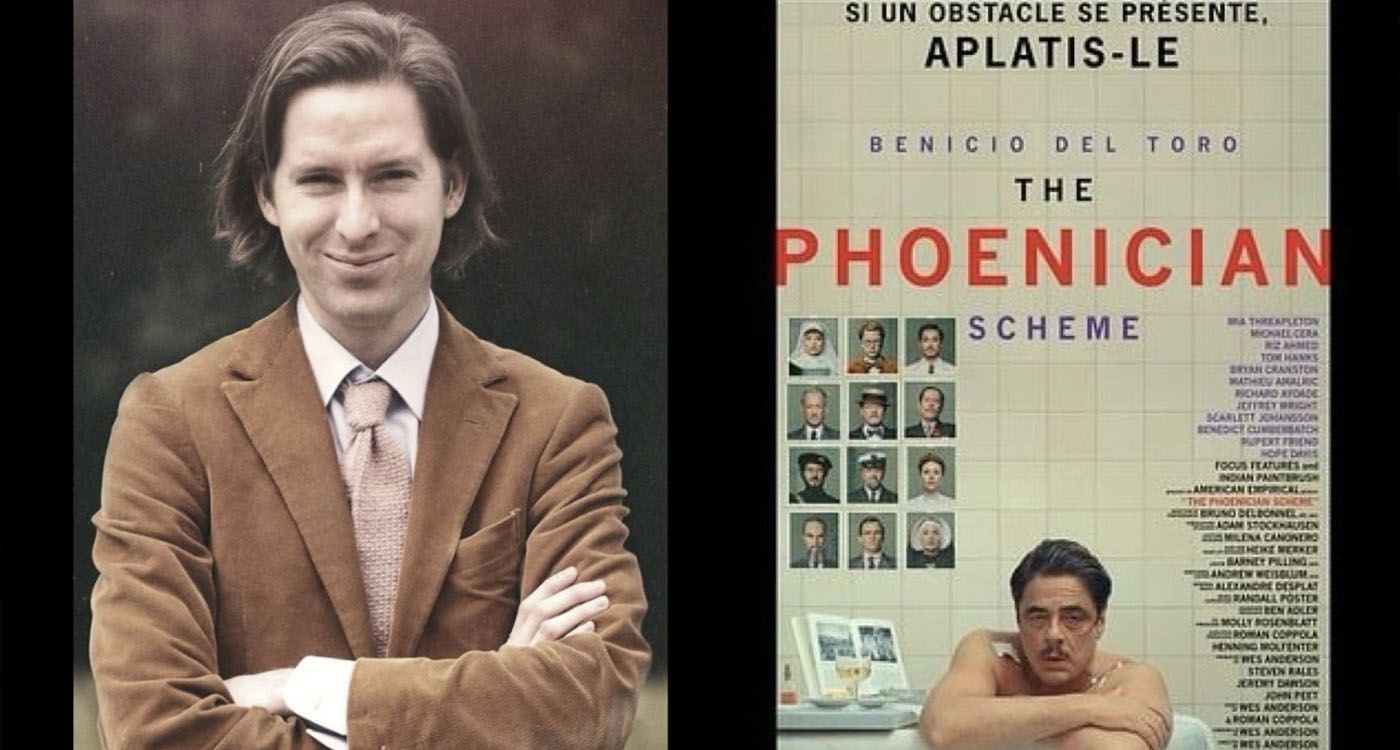
Wes Anderson, the master of symmetrical shots and offbeat storytelling, returned to Cannes in 2025 with The Phoenician Scheme, one of the festival’s most anticipated films. But despite high expectations, he left empty-handed. A look back at the singular world of a filmmaker who has become a genre of his own.
Some filmmakers develop a signature style, and Wes Anderson belongs to the rare group whose name has become shorthand for an entire world. His universe is instantly recognizable from a single frame: perfectly balanced compositions, pastel color palettes, characters as melancholic as they are poised, deadpan humor, precisely timed tracking shots and a sealed-off world where oddness is the norm. From Rushmore (1998) to The Grand Budapest Hotel (2014), including Moonrise Kingdom (2012) and The French Dispatch (2021), Anderson has built a meticulous body of work—somewhere between animated fable and deeply felt drama.
At Cannes 2025, The Phoenician Scheme, Anderson’s latest film, made its debut amid considerable buzz as his most ambitious film since The Grand Budapest Hotel. Officially in competition, the movie generated intense anticipation, especially with a cast that once again brings together a lineup of familiar faces: Tilda Swinton, Adrien Brody, Bill Murray—alongside several newcomers injecting fresh energy into the mix.
The Phoenician Scheme is a Mediterranean spy thriller set against a backdrop of archaeology, forged documents, real secrets and makeshift embassies. It follows a group of amateur diplomats tasked with recovering an ancient tablet stolen during a conference in Malta. In other words, the plot could fit on a sticky note—and that’s where the problem lies.
While The Grand Budapest Hotel (2014) skillfully combined farce and tragedy against the backdrop of a fading Europe, The Phoenician Scheme never manages to escape its own carefully crafted setting. Everything is precisely staged—the dialogue, the sets, the visual gags—but the engine runs on empty. It lacks the emotional depth that gave Gustave H.’s character an unexpected weight.
The film is undeniably beautiful. Every shot looks like a painting. Each scene feels meticulously planned, as precise as a Swiss watch. But in chasing elegance, Anderson seems to have lost some grit. While Moonrise Kingdom captured the innocence of young love, The Phoenician Scheme stays locked in irony, shying away from any true vulnerability.
The Leading Contender Let Down by His Own Mastery
This may be where the film missed out on the Palme: its refusal to embrace chaos. This year more than ever, Cannes seemed to be looking for authenticity, political cinema and stories marked by real pain. Yet, The Phoenician Scheme comes across as a clever exercise in style just when the world—both on and off screen—is calling for turmoil and anger.
In 2014, The Grand Budapest Hotel mixed absurd humor with memories of Central Europe, quietly hinting at the end of a fading world. In 2025, The Phoenician Scheme seems focused on… a setting. Even its title, misleadingly cryptic, reflects a preference for suggestion over clarity. But today’s audience no longer wants to solve puzzles without any emotional stakes.
Anderson’s full body of work deserves recognition. Few modern directors have created a style so instantly recognizable without becoming repetitive. From Fantastic Mr. Fox to Isle of Dogs, he even adapted his approach to stop-motion animation, bringing a uniquely original storytelling method. His focus on dysfunctional families, flawed father figures and bitter protagonists remains a strong thread, striking a deep chord in films like The Royal Tenenbaums (2001) and The Life Aquatic with Steve Zissou (2004).
But Anderson’s very distinctive style, which was once his strength, can sometimes work against him. The French Dispatch (2021), for example, sparked mixed emotions: some saw it as a love letter to journalism and France, while others viewed it a series of polished but emotionless scenes. The Phoenician Scheme takes this visually striking yet stifling style even further.
Anderson: His Own Worst Enemy?
The paradox with Wes Anderson is this: he’s celebrated for his style, but now, that same style draws criticism. It’s as if he’s become trapped inside his own creation. Being too distinctive risks getting stuck in a loop.
This isn’t to say The Phoenician Scheme is a bad film. It’s probably stronger than many others presented at Cannes this year. But it’s missing the extra something that turns a good movie into a great one. The jury, led by the politically engaged director Juliette Binoche, clearly recognized this.
Wes Anderson is far from done. He still has the potential to surprise and reinvent himself. At Cannes, there was talk that his next project might be a musical or a more stripped-down drama. Perhaps, like his characters, he needs to lose himself for a moment in order to find his way back.
In many ways, The Phoenician Scheme marks a turning point. It reveals that his signature style is beginning to wear thin, but it also hints at a genuine desire for change. With just a small shift—an unexpected move—Anderson could break free from repetition and fully reclaim his poetic voice.
Wes Anderson isn’t measured by the same standards as others. We expect him to build entire worlds. But even the most carefully crafted worlds need flaws. If The Phoenician Scheme disappointed at Cannes, maybe it’s a sign that it’s time for him to break through, to surprise audiences and amaze us once again.

Comments